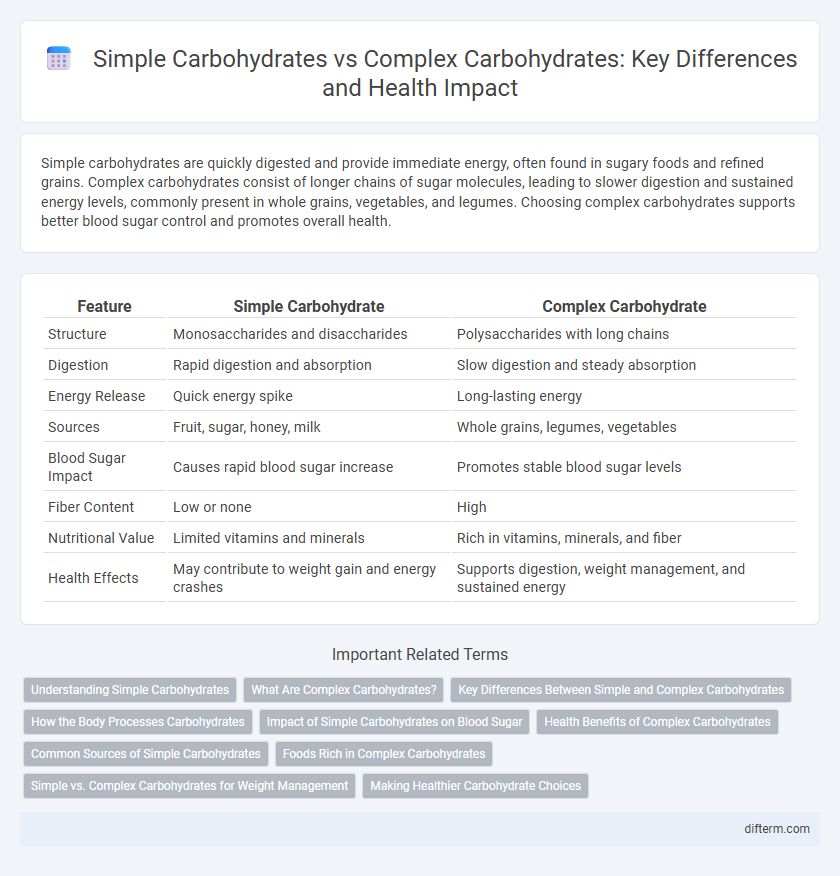Simple carbohydrates are quickly digested and provide immediate energy, often found in sugary foods and refined grains. Complex carbohydrates consist of longer chains of sugar molecules, leading to slower digestion and sustained energy levels, commonly present in whole grains, vegetables, and legumes. Choosing complex carbohydrates supports better blood sugar control and promotes overall health.
Table of Comparison
| Feature | Simple Carbohydrate | Complex Carbohydrate |
|---|---|---|
| Structure | Monosaccharides and disaccharides | Polysaccharides with long chains |
| Digestion | Rapid digestion and absorption | Slow digestion and steady absorption |
| Energy Release | Quick energy spike | Long-lasting energy |
| Sources | Fruit, sugar, honey, milk | Whole grains, legumes, vegetables |
| Blood Sugar Impact | Causes rapid blood sugar increase | Promotes stable blood sugar levels |
| Fiber Content | Low or none | High |
| Nutritional Value | Limited vitamins and minerals | Rich in vitamins, minerals, and fiber |
| Health Effects | May contribute to weight gain and energy crashes | Supports digestion, weight management, and sustained energy |
Understanding Simple Carbohydrates
Simple carbohydrates consist of one or two sugar molecules, making them quickly absorbed and rapidly raising blood glucose levels. Common sources include fruits, milk, and refined sugars found in candies and sugary beverages. Understanding their impact is crucial for managing energy spikes and supporting overall metabolic health.
What Are Complex Carbohydrates?
Complex carbohydrates are polysaccharides composed of long chains of glucose molecules, found abundantly in whole grains, legumes, and vegetables. These carbohydrates provide sustained energy by digesting slowly and stabilizing blood sugar levels, unlike simple carbohydrates that cause rapid spikes. Rich sources of complex carbohydrates include oats, brown rice, sweet potatoes, and lentils, which also supply essential fiber, vitamins, and minerals supporting overall metabolic health.
Key Differences Between Simple and Complex Carbohydrates
Simple carbohydrates consist of one or two sugar molecules, causing quick spikes in blood glucose levels and providing immediate energy. Complex carbohydrates contain longer chains of sugar molecules, which digest slowly, leading to sustained energy release and improved blood sugar control. Foods rich in complex carbohydrates, such as whole grains, legumes, and vegetables, also offer higher fiber content, essential vitamins, and minerals compared to simple carbohydrate sources like candy and sugary drinks.
How the Body Processes Carbohydrates
Simple carbohydrates are quickly broken down by the body into glucose, causing rapid spikes in blood sugar levels and providing immediate energy. Complex carbohydrates consist of longer chains of sugar molecules, which take more time to digest, resulting in a gradual release of glucose and sustained energy. Enzymes like amylase play a crucial role in breaking down these carbohydrates, with complex carbs promoting better blood sugar control and digestive health.
Impact of Simple Carbohydrates on Blood Sugar
Simple carbohydrates cause rapid spikes in blood sugar levels due to their quick digestion and absorption, leading to increased insulin production. Frequent consumption of simple carbs can result in blood sugar imbalances, insulin resistance, and higher risk of type 2 diabetes. Monitoring intake of simple sugars like glucose, fructose, and sucrose is essential for maintaining stable blood glucose control.
Health Benefits of Complex Carbohydrates
Complex carbohydrates provide sustained energy by breaking down slowly, which helps maintain stable blood sugar levels and reduces the risk of type 2 diabetes. Rich in dietary fiber, they promote digestive health, support weight management, and reduce cholesterol levels, contributing to cardiovascular health. Foods like whole grains, legumes, and vegetables offer essential vitamins and minerals, enhancing overall nutrient intake and immune function.
Common Sources of Simple Carbohydrates
Common sources of simple carbohydrates include fruits, honey, milk, and refined sugars found in candy, soda, and baked goods. These carbohydrates are quickly digested and absorbed, leading to rapid spikes in blood glucose levels. Unlike complex carbohydrates, simple sugars provide immediate energy but lack fiber and essential nutrients.
Foods Rich in Complex Carbohydrates
Foods rich in complex carbohydrates, such as whole grains, legumes, and vegetables, provide sustained energy and promote digestive health due to their high fiber content. These carbohydrates break down slowly, helping to regulate blood sugar levels and reduce the risk of chronic diseases like diabetes and heart disease. Incorporating brown rice, quinoa, lentils, and sweet potatoes into daily meals boosts nutrient intake and supports overall metabolic function.
Simple vs. Complex Carbohydrates for Weight Management
Simple carbohydrates are quickly digested and cause rapid spikes in blood sugar levels, often leading to increased hunger and potential overeating, which can hinder weight management efforts. Complex carbohydrates, found in whole grains, vegetables, and legumes, digest more slowly, providing sustained energy and promoting satiety, making them more effective for controlling appetite and supporting weight loss. Choosing complex carbohydrates over simple sugars helps regulate insulin levels and reduces fat storage, improving metabolic health and aiding long-term weight control.
Making Healthier Carbohydrate Choices
Choosing complex carbohydrates such as whole grains, legumes, and vegetables promotes sustained energy release and improved blood sugar control compared to simple carbohydrates found in sugary snacks and refined grains. Complex carbohydrates provide essential fiber, vitamins, and minerals that support digestive health and reduce the risk of chronic diseases like type 2 diabetes and cardiovascular conditions. Prioritizing foods rich in complex carbs helps maintain stable insulin levels and enhances overall nutritional quality for better long-term health outcomes.
Simple carbohydrate vs Complex carbohydrate Infographic

 difterm.com
difterm.com